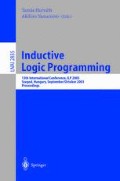Abstract
The learning system Progol5 and the underlying inference method of Bottom Generalisation are firmly established within Inductive Logic Programming (ILP). But despite their success, it is known that Bottom Generalisation, and therefore Progol5, are restricted to finding hypotheses that lie within the semantics of Plotkin’s relative subsumption. This paper exposes a previously unknown incompleteness of Progol5 with respect to Bottom Generalisation, and proposes a new approach, called Hybrid Abductive Inductive Learning, that integrates the ILP principles of Progol5 with Abductive Logic Programming (ALP). A proof procedure is proposed, called HAIL, that not only overcomes this newly discovered incompleteness, but further generalises Progol5 by computing multiple clauses in response to a single seed example and deriving hypotheses outside Plotkin’s relative subsumption. A semantics is presented, called Kernel Generalisation, which extends that of Bottom Generalisation and includes the hypotheses constructed by HAIL.
Access this chapter
Tax calculation will be finalised at checkout
Purchases are for personal use only
Preview
Unable to display preview. Download preview PDF.
References
Chang, C., Lee, R.C.: Symbolic Logic and Mechanical Theorem Proving. Academic Press, London (1973)
Furukawa, K., Ozaki, T.: On the Completion of Inverse Entailment for Mutual Recursion and its Application to Self Recursion. In: Proceedings of the Work-in- Progress Track, 10th International Conference on Inductive Logic Programming. LNCS, vol. 1866, pp. 107–119. Springer, Heidelberg (2000)
Inoue, K.: Induction, Abduction, and Consequence-Finding. In: Rouveirol, C., Sebag, M. (eds.) ILP 2001. LNCS (LNAI), vol. 2157, pp. 65–79. Springer, Heidelberg (2001)
Kakas, A.C., Kowalski, R.A., Toni, F.: Abductive Logic Programming. Journal of Logic and Computation 2(6), 719–770 (1992)
Kakas, A.C., Mancarella, P.: Database Updates through Abduction. In: Proceedings of the 16th International Conference on Very Large Databases, pp. 650–661. Morgan Kaufmann, San Francisco (1990)
Kakas, A., Van Nuffelen, B., Denecker, M.: A-system: Problem solving through abduction. In: Proceedings of the 17th International Joint Conference on Artificial Intelligence, pp. 591–596. Morgan Kaufmann, San Francisco (2001)
Muggleton, S.H., Bryant, C.H.: Theory Completion Using Inverse Entailment. In: Cussens, J., Frisch, A.M. (eds.) ILP 2000. LNCS (LNAI), vol. 1866, pp. 130–146. Springer, Heidelberg (2000)
Muggleton, S.H., De Raedt, L.: Inductive Logic Programming: Theory and Methods. Journal of Logic Programming 19,20, 629–679 (1994)
Muggleton, S.H.: Inductive Logic Programming. New Generation Computing 8(4), 295–318 (1991)
Muggleton, S.H.: Inverse Entailment and Progol. New Generation Computing, Special issue on Inductive Logic Programming 13(3-4), 245–286 (1995)
Plotkin, G.D.: Automatic Methods of Inductive Inference. PhD thesis, Edinburgh University (1971)
Ray, O.: HAIL: Hybrid Abductive-Inductive Learning. Technical report 2003/6, Imperial College, Department of Computing (2003)
Stickel, M.E.: A Prolog technology theorem prover: Implementation by an extended Prolog compiler. Journal of Automated Reasoning 4(4), 353–380 (1988)
Yamamoto, A.: Which Hypotheses Can Be Found with Inverse Entailment? In: Džeroski, S., Lavrač, N. (eds.) ILP 1997. LNCS, vol. 1297, pp. 296–308. Springer, Heidelberg (1997)
Yamamoto, A.: An Inference Method for the Complete Inverse of Relative Subsumption. New Generation Computing 17(1), 99–117 (1999)
Yamamoto, A.: Using Abduction for Induction based on Bottom Generalisation. In: Abduction and Induction: Essays on their relation and integration. Applied Logic Series, vol. 18, pp. 267–280. Kluwer Academic Publishers, Dordrecht (2000)
Yamamoto, A., Fronhöfer, B.: Hypothesis Finding via Residue Hypotheses with the Resolution Principle. In: Proceedings of the 11th International Conference on Algorithmic Learning Theory. LNCS, vol. 1968, pp. 156–165. Springer, Heidelberg (2000)
Author information
Authors and Affiliations
Editor information
Editors and Affiliations
Rights and permissions
Copyright information
© 2003 Springer-Verlag Berlin Heidelberg
About this paper
Cite this paper
Ray, O., Broda, K., Russo, A. (2003). Hybrid Abductive Inductive Learning: A Generalisation of Progol. In: Horváth, T., Yamamoto, A. (eds) Inductive Logic Programming. ILP 2003. Lecture Notes in Computer Science(), vol 2835. Springer, Berlin, Heidelberg. https://doi.org/10.1007/978-3-540-39917-9_21
Download citation
DOI: https://doi.org/10.1007/978-3-540-39917-9_21
Publisher Name: Springer, Berlin, Heidelberg
Print ISBN: 978-3-540-20144-1
Online ISBN: 978-3-540-39917-9
eBook Packages: Springer Book Archive

